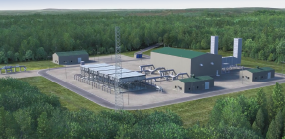This paper presents a discussion of contracts for natural gas commodity, transportation and storage services signed by large natural gas consumers and local distribution companies. The issues addressed here can be summarized by a series of questions:
- Has the move away from long-term contracts in the U.S. gas industry increased the risk profile for new pipeline and LNG projects?
- Will the move away from long-term contracts affect the timing and level of new pipeline and LNG investments?
- Is there a public interest to be served by policies that would facilitate an increase in prevalence of long-term contracts as part of diversified contract portfolios?
This paper provides background information on the relevant issues, estimates what is at stake in terms of economic consequences and discusses available policy options, including encouraging more long-term contracts. The analysis conducted here finds that the move away from long-term contracts has increased the risks of infrastructure investment and that these added risks could indeed influence whether, and when, investments are made. The paper also shows that there are large adverse economic consequences of infrastructure delays in terms of higher natural gas prices and greater price volatility. The direct costs to gas consumers of delays of 12 to 36 months in natural gas infrastructure construction would range from $179 to $653 billion over the next 15 years. There would also be additional costs born by consumers through higher electricity prices and lost jobs as energy-intensive industries adjusted to higher energy prices. In addition, the volatility of gas and electricity prices would go up if natural gas infrastructure is delayed, causing further economic loss through slower and less efficient investment decisions by energy producers and consumers.
Given these factors, encouraging more long-term contracting by all classes of shippers should be considered as an element in Federal and State policies to ensure adequate investment to maintain current capacity as well as adequate investment to expand natural gas infrastructure to meet market demand. Also, measures to encourage portfolios with long-term contracts should address the regulatory and market risks for cost recovery.
– Will the move away from long-term contracts affect the timing and level of new pipeline and LNG investments? – Is there a public interest to be served by policies that would facilitate an increase in prevalence of long-term contracts as part of diversified contract portfolios? energy prices. In addition, the volatility of gas and electricity prices would go up if natural gas infrastructure is delayed, causing further economic loss throug slower and less efficient investment decisions by energy producers and consumers.
This paper provides background information on the relevant issues, estimates what is at stake in terms of economic consequences and discusses available policy options, including encouraging more long-term contracts.
This paper presents a discussion of contracts for natural gas commodity, transportation and storage services signed by large natural gas consumers and local distribution companies. The issues addressed here can be summarized by a series of questions:
The analysis conducted here finds that the move away from long-term contracts has increased the risks of infrastructure investment and that these added risks could indeed influence whether, and when, investments are made. The paper also shows that there are large adverse economic consequences of infrastructure delays in terms of higher natural gas prices and greater price volatility. The direct costs to gas consumers of delays of 12 to 36 months in natural gas infrastructure construction would range from $179 to $653 billion over the next 15 years. There would also be additional costs born by consumers through higher electricity prices and lost jobs as energy-intensive industries adjusted to higher
Given these factors, encouraging more long-term contracting by all classes of shippers should be considered as an element in Federal and State policies to ensure adequate investment to maintain current capacity as well as adequate investment to expand natural gas infrastructure to meet market demand. Also, measures to encourage portfolios with long-term contracts should address the regulatory and market risks for cost recovery.
– Has the move away from long-term contracts in the U.S. gas industry increased the risk profile for new pipeline and LNG projects?



